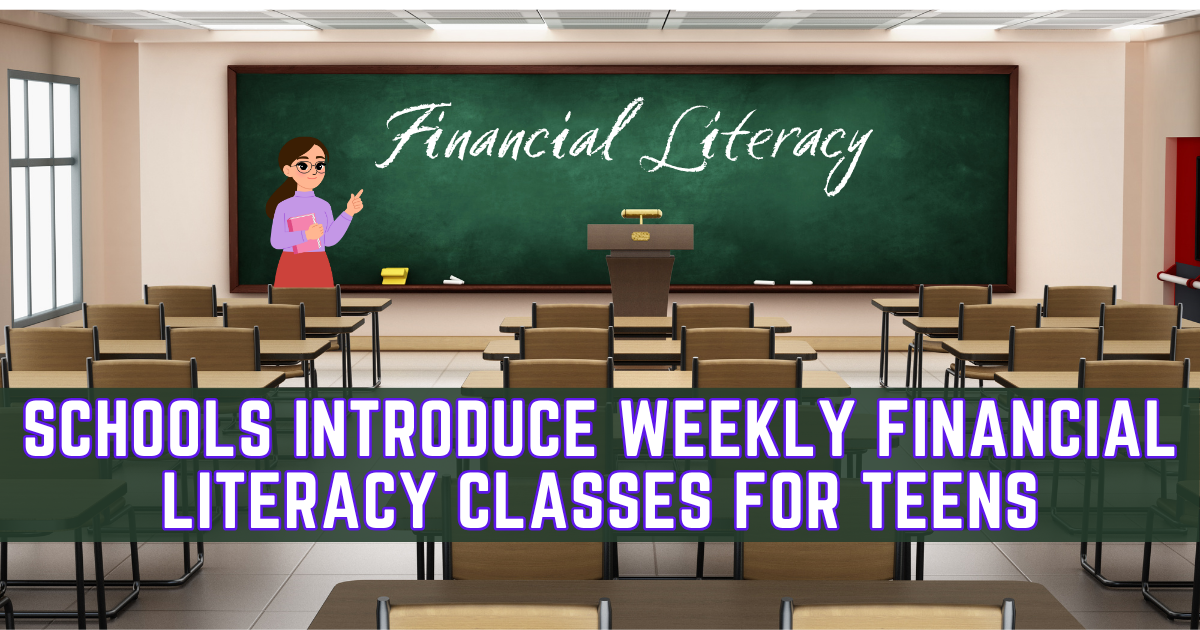Schools Introduce Weekly Financial Literacy Classes for Teens. Every person must have a basic understanding of financial literacy, as it is essential in today’s world. Many schools have launched weekly financial literacy classes for teenagers to teach them more about savings and investing for their future benefits. There are many ways in which a financially literate person can earn and save money. It is also important to plan the budget and know how to spend money wisely. To know more about the topic “Schools Introduce Weekly Financial Literacy Classes for Teens,” read the complete article.
Schools Introduce Weekly Financial Literacy Classes for Teens
Many schools have introduced financial literacy foundations courses that teach students how to make informed financial decisions that encourage financial well-being over their lifetime. Introducing financial literacy to teens is an excellent way to maximize their understanding early on and enhance their financial well-being. In these classes, students are taught in detail about earning wages, investing for the future, saving money, managing their finances, and much more. With the help of these classes, students become more responsible and stop wasting money as they learn its importance.

Financially literate students are also an asset to the country they are residing in. They have proper knowledge of budgeting and investing, which makes the cash flow better. This is beneficial for them, their family, and the economy of the country. Financial literacy in schools helps build groundwork for responsible money management. Educating teens on how to manage personal finances responsibly, even handling their monthly allowances, prepares them for bigger financial decisions later in life.
What is Financial Literacy?
Financial literacy means the knowledge and skills needed to make important financial decisions. It refers to the understanding that includes how to earn, manage, and invest money and has a major impact on students’ ability to make better decisions. According to a Global Financial Literacy Excellence Center survey on financial anxiety, not only does increasing your knowledge of money matters make it easier to manage your finances, but it can also help you lower your stress levels: Knowledge of key financial concepts is tied to less financial stress and anxiety.
Importance of Financial Literacy
There are a lot of advantages of educating teens about financial literacy; some of them are
Personal Financial Management
By teaching teens about financial literacy, we provide them knowledge about managing their personal finances. It helps them understand budgeting, saving, investing, and debt management, allowing them to make informed decisions about their money and achieve their financial objectives.
Making Informed Financial Decisions
If teens have the financial knowledge from the start, they will be able to get better use of their money. This will ensure they are making informed financial decisions. They will be able to understand the terms and conditions of loans, mortgages, insurance policies, and investment opportunities, enabling them to make informed choices that align with their financial needs and objectives.
Fosters Confidence
When teens have deep knowledge about financial management, they will automatically get the confidence. Imagine having to make a life-changing financial decision without all the necessary information. With knowledge about finances, individuals can approach major life choices with greater confidence. They’ll be more likely to achieve the outcome they desire and less likely to be surprised or negatively impacted by unforeseen outcomes.
Avoiding Debt
Understanding how credit works, the danger of high-interest loans, and the importance of paying off debt can prevent individuals from accumulating unmanageable debt. Financial literacy educates people about the consequences of financial decisions.
Planning for Retirement
Financial literacy plays a major role in retirement planning. It helps individuals understand retirement accounts, investment strategies, and the significance of saving for the future. With this knowledge, individuals can plan and save for retirement early, guaranteeing a comfortable and secure post-work life.
Empowerment and Independence
Financial literacy empowers individuals to take control of their financial lives. It eliminates the dependency on financial advisors or institutions by equipping individuals with the skills and knowledge to handle their money independently. It fosters financial confidence and allows individuals to make decisions that align with their values and long-term goals.
Preparation for Financial Emergencies
Financial literacy helps people to know more about topics such as saving or emergency preparedness and gets individuals ready for uncertain times. Even though a significant unforeseen expense or job loss can have a negative financial impact, a person can lessen the impact by consistently saving money.

Mark Delyn focuses on education, learning methods, and academic trends. Her work supports students, educators, and lifelong learners with practical and timely insights.








